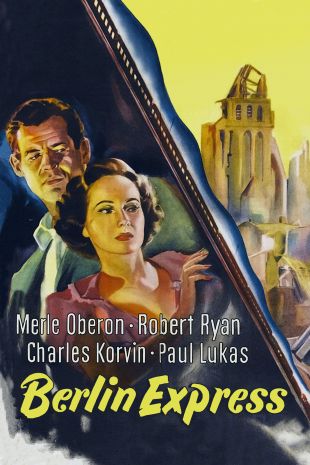Jacques Tourneur's Berlin Express came out of that same school of thriller-making that generated Henry Hathaway's The House on 92nd Street at Fox, except that it was a lot better and more exciting. The extensive use of location footage, the documentary-style shooting and narration, and the reliance on strict verisimilitude all recall Hathaway's movie, as well as Alfred Werker's and Anthony Mann's He Walked by Night. Unlike the Fox film, Berlin Express was fiction, a thriller of today (in 1948), and it was able to engage in storytelling on a level that no fact-based thriller would permit of its script. Indeed, the location shooting in occupied postwar Germany and the turmoil of postwar France, coupled with a script that alternates between the subtle comedy of human foibles and the bitterness and distrust in the air in the period immediately after the war, make the opening 25 minutes of Berlin Express feel like a dry-run for Carol Reed's The Third Man. The tone isn't nearly as wry as Reed's movie, but the basic idea and mix is there, juxtaposed with a police procedural tone similar to He Walked by Night -- and in place of the romantic triangle at the center of the Reed movie, there is a top-flight spy thriller. Curt Siodmak's script could easily be the best of his entire career, by turns (and sometimes even simultaneously) comedic, serious, and sardonic. The tone turns decidedly grimmer around 45 minutes into the film, and from there, we get a more intensely serious film, with two scenes (one involving a mortally wounded man in a clown suit who is trying to pass along vital information in front of a laughing audience, and the other a mirror shot) that are as good as anything Alfred Hitchcock ever conceived. Tourneur handles his actors as well as his action beautifully, Merle Oberon sacrificing some of her glamorous image for a serious acting role and Robert Ryan, Robert Coote, Charles Korvin (later a blacklistee), and Roman Toporow melting into their portrayals of Allied representatives who are roped into the case. In the ruins of Frankfurt and Berlin, cinematographer Lucien Ballard does some of his best work, shooting in such locations as the narrow corridors of a darkened train and the wreckage of a bombed out brewery.

Berlin Express (1948)
Directed by Jacques Tourneur
Genres - Action, Adventure, Drama, Spy Film, War, Crime, Thriller |
Sub-Genres - Action Thriller, Unglamorized Spy Film |
Release Date - May 7, 1948 (USA - Unknown) |
Run Time - 86 min. |
Countries - United States |
MPAA Rating - NR
Share on